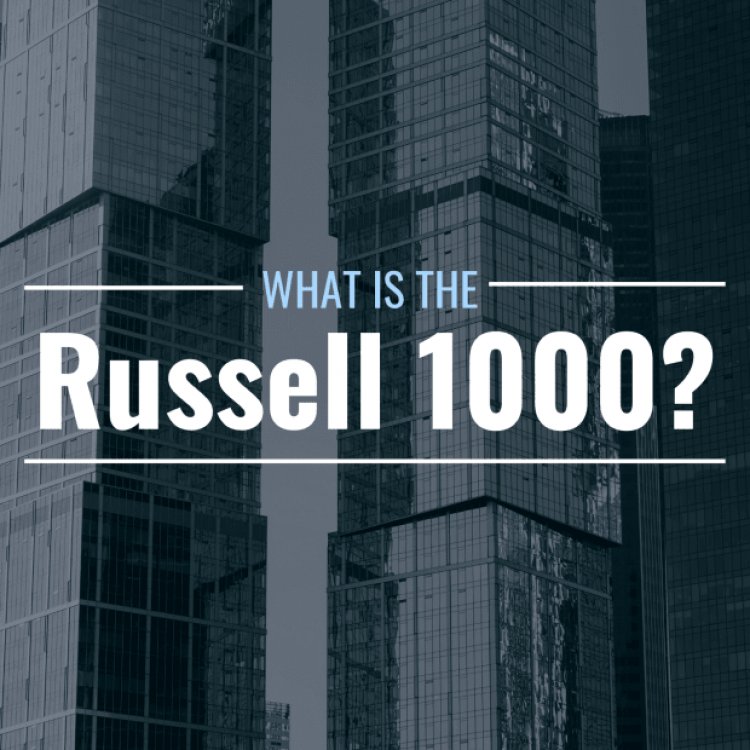What Is the Russell 1000 Stock Market Index? Why Is It Important?
What Is the Russell 1000 Stock Market Index? The Russell 1000 is a stock market index that tracks the performance of the 1,000 largest U.S. companies weighted by market cap. It is a subset of the Russell 3000, which contains nearly every security traded on the NYSE and Nasdaq stock exchanges. ...


GaudiLab from Getty Images; Canva
What Is the Russell 1000 Stock Market Index?
The Russell 1000 is a stock market index that tracks the performance of the 1,000 largest U.S. companies weighted by market cap. It is a subset of the Russell 3000, which contains nearly every security traded on the NYSE and Nasdaq stock exchanges.
You would think that an index containing nearly every large-cap stock trading on U.S. exchanges would command a lot of attention, but it seems more ink gets spilled on the Russell 2000 index because it’s considered a benchmark for the small-cap sector.
Small-cap companies can be notoriously volatile, and their low trading volume often means it is difficult to understand their price movements, which makes having an index like the Russell 2000 especially useful. Mutual fund managers, in particular, often track their portfolio performance against the Russell 2000.
Why Is the Russell 1000 Important?
Just because analysts keep a close eye on the Russell 2000 doesn’t make the Russell 1000 any less important. Investors can turn to the Russell 1000 to see at a glance how both mid- and large-cap companies are performing. In fact, the Russell 1000 is a much broader index than the S&P 500, since it’s made up of nearly twice as many companies, and as such, its performance could be considered a more accurate reflection of the U.S. equity market as a whole.
How Is the Russell 1000 Weighted?
Each component in the Russell 1000 is weighted by market cap, or the total market value of all outstanding shares. Capitalization-weighted indexes like the Russell 1000 differ from other indexes, such as the Dow Jones Industrial Average, which are weighted by share price.
The Dow is often criticized for being weighted in this way, since price is the only measure of its value, and that doesn’t provide the most accurate view of the stocks it is tracking. For example, when a stock splits, its share price is halved, and thus it would be worth considerably less to the index unless adjustments are made to the index’s divisor.
Which Companies Make Up the Russell 1000?
The names that make up the Russell 1000 are some of the biggest companies in the equity universe. They range in size between $1.8 billion and $1.4 trillion. Here are the 10 largest holdings in the Russell 1000 as well as the sectors they represent:
To see the complete list of Russell 1000 components, visit the FTSE Russell website.
Who Manages the Russell 1000?
The Russell 1000 is managed by FTSE Russell, a subsidiary of the London Stock Exchange Group, which has provided benchmarking, analytics, and data solutions for investors since 1995.
FTSE Russell indexes distinct segments of the stock market, categorizing them by size, (from micro-cap to large-cap) as well as by investment style (growth and value). It offers several different variations of the Russell 1000 alone:
- Russell 1000 Value
- Russell 1000 Growth
- Russell 1000 Defensive
- Russell 1000 Dynamic
What Is the “Russell Rebalancing?” Is the Russell 1000 Affected?
Every year, the FTSE group examines the components within the Russell 1000, Russell 2000, and Russell 3000 indexes and determines if any stocks should be added or deleted from the indexes. This practice is known as the “Russell Rebalancing.”
Analysts first rank the universe of U.S-based stocks by market cap, with the largest 3,000 stocks getting added to the Russell 3,000. They then further categorize the list by float-adjusted market cap, and these stocks get “banded” into the Russell 1,000 and Russell 2,000 indexes.
Adding or subtracting a company from a Russell index can cause an enormous swing in share prices, since many institutional investors include Russell components in their portfolios and adjust their holdings to reflect the changes in the index.
In fact, the entire stock market watches the Russell Rebalancing date carefully. It usually takes place on the fourth Friday in June.
How Can I Buy the Russell 1000?
The ticker symbol for the Russell 1000 is ^RUI; however, you can’t invest directly in the Russell 1000 because it is not tradable. However, there are several ETFs and mutual funds that track the index, such as the Vanguard Russell 1000 mutual fund (VRINX) and the iShares Russell 1000 Index ETF (IWB). Check with your online broker for the complete list.
What's Your Reaction?


























































